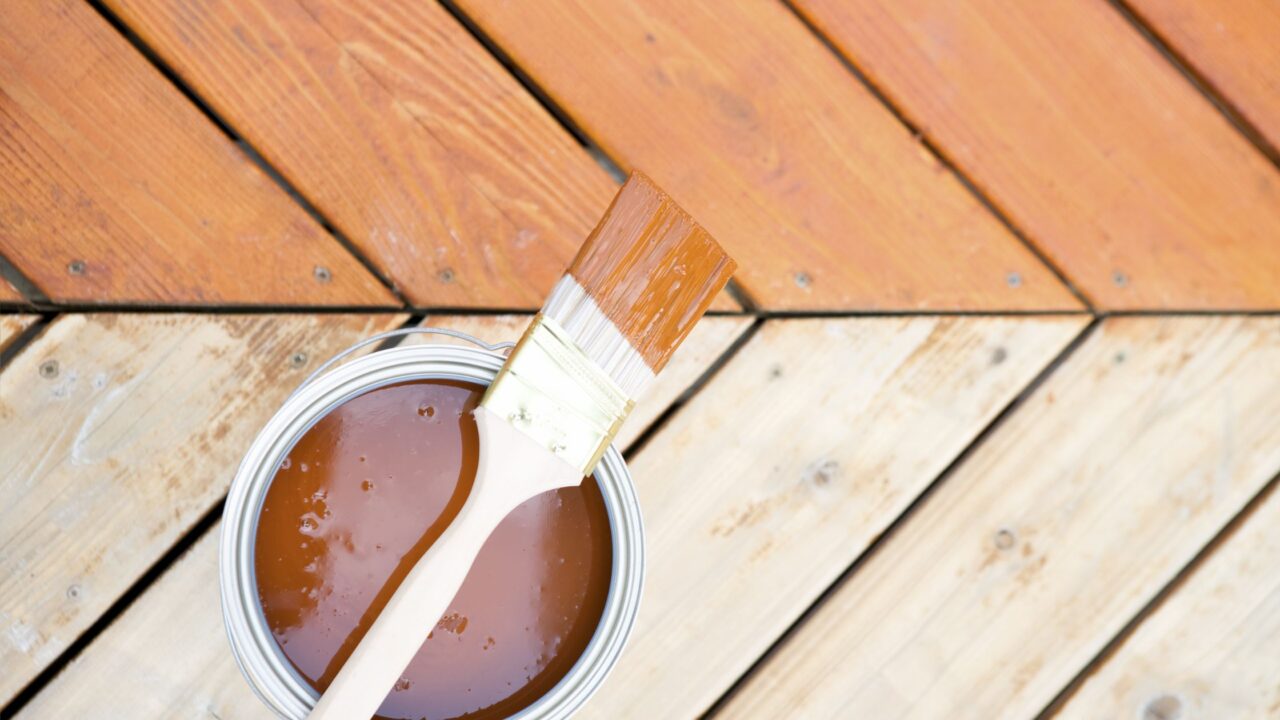Most deck stains last 2–5 years depending on the type of stain, exposure to the elements, and how well the surface was prepared. Transparent and clear stains fade faster, while solid stains offer longer protection — but require more prep when reapplying.
How Long Does Deck Stain Last?
If you’ve ever gone to sit on your deck and noticed dull color, splintering wood, or mildew in the corners, you’ve already felt the effects of time on a stained surface. While stain helps protect your deck from sun, moisture, and foot traffic, it doesn’t last forever — and knowing when to re-stain can save you thousands in future repairs.
In this article, we’ll break down how long different types of deck stains typically last, what factors affect stain longevity, and how to get the most out of your investment.
🕓 Average Lifespan by Stain Type
Not all stains are created equal. Here’s what to expect from each major type:
| Stain Type | Expected Lifespan | Best For |
|---|---|---|
| Clear/Transparent | 1–2 years | Natural wood look, light foot traffic |
| Semi-Transparent | 2–3 years | UV protection with visible wood grain |
| Semi-Solid | 3–4 years | Deeper color and more coverage |
| Solid/Opaque | 4–5 years | Full coverage, older or worn decks |
🧠 Important: These are average ranges — decks in full sun, heavy moisture, or with high traffic will often need more frequent staining.
🌤️ 5 Factors That Impact How Long Deck Stain Lasts
1. Sun Exposure
UV rays break down stain pigments and dry out the wood underneath. South- or west-facing decks typically fade faster.
2. Moisture and Weather
Rain, snow, and freeze-thaw cycles (especially here in Northeast Ohio) weaken the bond between the stain and wood. If water doesn’t bead up anymore, the protection is gone.
3. Wood Type and Condition
- Softwoods like pine or spruce absorb stain differently than hardwoods like cedar.
- Older, rougher wood may require more frequent upkeep than smooth, new boards.
4. Surface Preparation
Poor prep = poor performance. If the deck wasn’t cleaned, dried, or sanded properly, even the best stain will fail early.
5. Foot Traffic and Furniture
High-use decks wear down faster. Dragging chairs, pets with claws, and heavy planters can create uneven wear.
👣 Pro Tip: Use felt pads under furniture and avoid pressure washing on high settings to extend the life of your stain.
🔍 Signs Your Deck Stain Is Wearing Off
Wondering if it’s time to reapply? Here’s what to watch for:
- Faded or patchy color
- Water soaks into the wood (no longer beads)
- Surface feels dry, rough, or splintery
- Growth of mold, algae, or mildew
- Peeling, flaking, or bubbling stain
If you see more than one of these signs, your deck is likely due for a refresh. Learn more in our full guide: Signs It’s Time to Re-Stain Your Deck.
🧰 How to Make Deck Stain Last Longer
You can’t control the weather, but you can extend the life of your stain with smart care:
✅ Clean your deck seasonally
Use a mild deck cleaner or diluted dish soap to remove grime, leaves, and mold before it eats into the finish.
✅ Re-coat before total failure
Don’t wait until the stain is fully gone — a light maintenance coat is easier (and cheaper) than starting over.
✅ Use the right product for your needs
We help clients choose stains based on sunlight, wood age, and whether they prefer a natural or painted look.
✅ Avoid over-applying stain
Too much stain can lead to sticky surfaces or peeling. One or two thin coats are better than one heavy one.
📅 Quick Reference: Re-Stain Timing Guide
| Deck Exposure | Stain Type | Reapply Every… |
|---|---|---|
| Full Sun & High Traffic | Semi-Transparent | 1.5–2 years |
| Partial Shade | Solid or Semi-Solid | 3–5 years |
| Covered or Screened | Any Type | 3–6 years (lower wear) |
⏳ Not sure where you fall? We offer free on-site stain inspections to help you plan your next re-stain with confidence.
👷 Why Professional Staining Lasts Longer
At Colin Can Help, we follow a tested process that sets your deck up for long-term success:
- Full surface prep (including washing and sanding if needed)
- Wood moisture checks before stain goes down
- Application at the proper temperature and humidity levels
- Product selection based on your goals and wood type
And if something unexpected happens — rain, wood movement, or product issues — we’ll make it right.
🧠 FAQ
Q: Can I extend the life of stain with a sealer on top?
Most stains already include sealers. Adding a separate product can cause issues unless it’s specifically compatible.
Q: How long should I wait before restaining a brand-new deck?
Typically 3–6 months, depending on the wood type and weather. The wood needs to dry and release its mill glaze.
Q: Will a solid stain really last longer than transparent?
Yes — solid stains form a thicker film and block UV better. But they also require more prep when reapplying.
Q: Do you need to strip old stain before reapplying?
It depends. If it’s peeling or uneven, yes. If it’s just faded and you’re using the same type of stain, a thorough cleaning may be enough.
Q: Can I just touch up high-traffic areas?
It’s possible, but the color may not match exactly. Spot touch-ups are best for short-term improvements.

